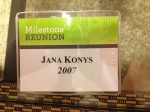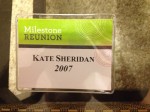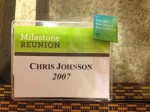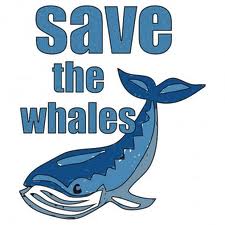Maybe it’s because I was doted on as an only-child — or maybe I’m just an idiot. But somehow I came to believe that when it came to a person’s goals & dreams & projects, the accepted discourse was to praise them. Genuinely, if they were good, and phonily if they were not. At least if it was someone you didn’t know that well.
As you can see from my updated “About” page, I was WAY off. I am up to my danglers in what they call “constructive” criticism, and I’m finding, shockingly, it’s not all that fun. It’s like I have a tattoo on my chest that says “Please, Opinion All Over Me.” Or like there’s a virus going around affecting people’s opinion epicenter, causing people to projectile-vomit opinion juice all over you. I’m becoming conditioned to wear hoods and carry umbrellas, to duck & jive like goddamn Fred Astaire to avoid the downpour of thoughts & advice.
True, my blog is different than my actual writing. And, true, the blog doesn’t matter to me really. So why should I care what people say about it?
I shouldn’t. But I do. And here’s why:
I am irrational.
More nuanced explanation: In my irrational mind, I’ve knotted my blog and my fiction into one general experience. The blog was designed to represent the fiction as a “platform,” (something I’m beginning to think is nothing more than a semi-religious ritual we’ve invented, the literary equivalent of a talisman designed to draw in good fortune and ward off pitfalls), so a dis to the blog, to me, is a dis to my very effort to be a writer.
My solution, I’ve decided, is to start doing a better job of shutting the hell up about what I’m up to these days. Ironically, this was what one of my more fervent critics suggested I do to begin with. But it’s not at his insistence I heed the advice. Rather, it’s from the sage-like guidance of my awesome-ass girlfriend, Julie. (I wanted to romanticize her by calling her J., or perhaps J-Love or J-Sauce or something, but she wouldn’t let me. Said she’s ‘not a private person.’ Oh well.)
So Julie said to me this: If you’ve got something good going, it does no good to talk about it.
And she’s right. Because people are not predisposed toward being supportive of other people. I know this, of course, and can relate to it. When someone does something really great, something I could never do, I think, “This sick, perverted bastard, this self-aggrandizing pig-fornicating son of a bitch, how dare he?” But I don’t say that. What I say is, “Hey, swell! Good on you, partner!” And I mean it, because I know that the voice in my head is nothing but an irrational defense mechanism taking the form of anger toward another person for triggering my own fear of failure.
I thought everyone did this, but I’ve come to find out many people have no bones about spelling out pretty clearly that they doubt you, or at least that they plan to make you believe they do. Some are passive-aggressive, others are regular-aggressive, and others are just coy, knowing what you want to hear & content to take a ninja star to the ass before uttering it.
A few actually have your best interest at heart. Here’s a gem from my dear mother, a clinical psychologist who recently attended a conference on, wait for it, trauma (yes, a whole conference on trauma):
I’m in my bathroom. It’s like 8:30 a.m. I’m brushing my teeth. My phone rings and I see it’s my mom. My first thought is that someone is dead–hopefully one of the older folks (less tragic, saw it coming, full life, etc). But instead, when I say ‘hello,’ I get this:
Nick! I’m at the Sensorimotor Psychotherapy training course and they’re talking about how, when trauma interrupts developmental movements, people get stuck in ‘not-me’ self states, experiencing incomplete ‘movements’ in achieving their goals, and it hit me that the title of your blog is a manifestation of your ‘not-me’ self-state, your belief that you’ll never be published. But you’re a journalist who’s published every day, so I realized being published is not really the issue as much as your desire for the experience of having an audience read your fiction, and since one way that we correct these stunted developmental movements is to find words that accompany the actions we desire, I think I’ve thought of the perfect name for your blog. Are you ready for this? ‘The Missing Experience’! What do you think? I had to call you immediately.
Aw. Thanks mom. If only all criticism were so well-intentioned.
Jury’s still out on the suggestion.
I should note I’ve gotten plenty of positive feedback on the blog as well. But what kind of writer would I be if I took it to heart, the way I take to heart all the negative stuff?
But getting back to today’s moral: the first rule of writing is not to talk about your writing. The first rule of anything you want to do, really, is to shut the hell up and just do it on the sly, so that by the time people know you’re doing it, it’s done.
At least for me. I don’t know if it’s universal. I was tempted to end this blog with a wrap-up graph in first-person plural, as in, “We all do X, and we all learn Y.” But that’s presumptive. Suffice it to say: I started out young, with a narrow scope, surrounded only by people that cared for & supported me, so I came to believe that the natural human condition was mutual support. But as I’ve branched out into a world of people who don’t know me and have no obligation to dig me, I’ve realized it isn’t like that. People come to view happiness as a zero-sum resource that must be fought over, albeit in an often subtle, unstated way.
So it’s like that talking computer said in that movie WarGames: The only way to win is not to play.
I’ll keep blogging though, on occasion. I’ve kind of committed to it. Plus, I guess, at least 3 of you enjoy it.















